From the Director of Early Learning
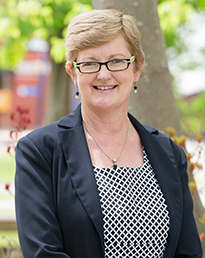 Dear Families,
Dear Families,
As we enter the half way point of Term 1 it is timely to reflect on some of the key threads of our accomplishments and focus so far. All of these come under the key area of wellbeing.
As a centre, we are empowering our children to develop their independence throughout their day at the ELC. With the belief that children’s agency enhances wellbeing, we are providing and supporting opportunities for them to have a voice, to express their ideas and thoughts and to ensure we, the adults, are listening to them. In order to develop confidence to share their ideas in a group situation with their peers and educators, they need to develop the relationships and trust to do this.
You may have noticed across the centre that there has been a focus on the identity of an individual within a group. We believe that firstly the child must be clear about who they are in order to function in a group. This is why we love to share family photos, have parents/family members visit the rooms, creating such a strong connection between home and the ELC. We also love to share family traditions and special stories that enhance the child’s identity in their new peer group.
Some children have the ability to create their identity in their own way; they have confidence within the group, and skills in place to share who they are. There are a myriad of reasons for this. Others need us to facilitate the process, to ensure we are giving equal voice in our groups, to vary the size of the group to bring out the voices and to offer experiences of learning where the child can begin to develop confidence and expressions. At all times the educators are watching, waiting and anticipating what might happen. Equipped with the skills to notice and value, they document and share with their team so that moments are not lost, but rather built upon.
This leads to the development of agency in a child. If they are listened to and their opinion has value, then they begin to understand that they can make a difference. After all, we do not want everyone thinking in the same way and going about their learning in a prescribed manner. If we think about a group of adults in a professional sense, trying to find solutions in order to move forward, we need people who have the ability to think outside the square and strategies to promote their ideas. This skill set begins at birth – with problem solving, communicating, risk taking – all of which are life skills that must be built upon in our educational settings.
I do hope that this gives you some background to how we drive our teaching and learning program with such a strong emphasis on wellbeing. Many people associate wellbeing from a physical and emotional perspective, we are trying very hard to ensure we are identifying all of the areas of wellbeing and looking more deeply than just the obvious. I invite parents/family members to communicate with me what you are noticing about your child’s development since the start of this year. We are commencing parent focus groups and are looking for interested parties to join us on our journey of increasing awareness about wellbeing in the young child. We are curious to gain the parent perspective.
Looking forward to seeing many of you at this Friday’s Twilight Picnic.
Kind regards,
Kate Mount
ELC Twilight Picnic
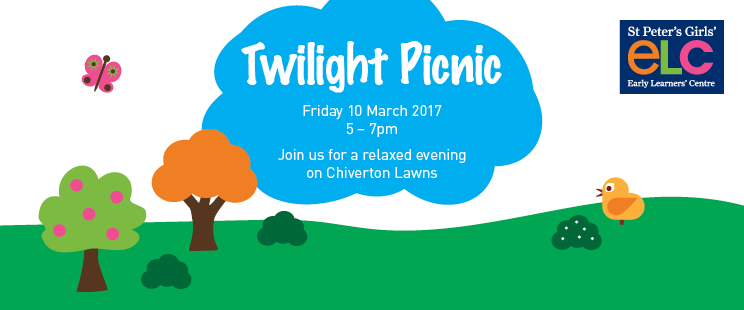
暮色野餐
3月10日 星期五下午5-7点,来Chiverton Lawns加入我们的野餐吧!
届时,现场会有Friends of ELC工作人员出售烤肠面包和饮料,您也可以自己带上零食,我们一起在Chiverton Lawns聊聊天,一起度过放松的夜幕时光!
另:现场还有奖券出售哦!
Letter from Miss Qian
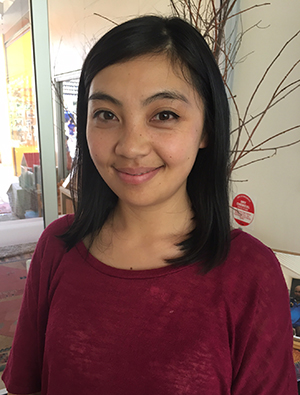 暮光野餐
暮光野餐
尊敬的家长,本周五(3月10日)下午5-7点,Friends of ELC (一个由学生家长组成的志愿者小组)为ELC的家庭组织了一场暮光野餐,现场会有Friends of ELC的工作人员出售烤肠面包和饮料,您也可以自己带上零食,饮料及野餐毯子等,和您的孩子一起在Chiverton Lawns一起度过一个愉快而放松的傍晚,现场还有奖券出售哦!
这是一个您和孩子跟ELC社区的其他家庭认识和了解的机会 — 结识更多的朋友,增加您和孩子的归属感,届时, ELC的老师们也会在现场,我们期待您和孩子的加入!
如果您有任何疑问或者需要任何帮助请联系ELC中文老师 Ms Qian (Stonyfell Room)或者发邮件至 qpu@stpetersgirls.sa.edu.au
时间:3月10日下午5-7点
地点:Chiverton Lawns
Adelaide Network Reggio Group
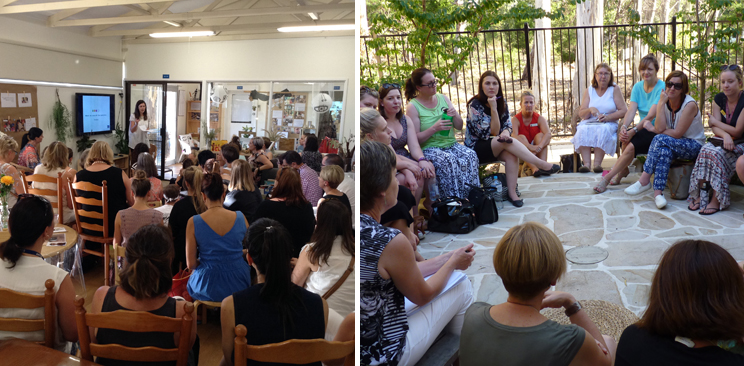
St Peter’s Girls’ Early Learners’ Centre staff are actively involved in the Adelaide Network of the Reggio Group. This involves being members of the national group of REAIE , attending professional learning and sharing our practice with interested participants. Every term interested members meet at a site to share their understandings and practice.
Last week we hosted the network gathering and we had an overwhelming number of people attend. There was a range of teachers, principals and lecturers representing sites from multiple sectors. Our centre was complimented highly on its presentation but also on our team, the collaboration and engagement in dialogue across the centre. This provided a wonderful welcome to our visitors and was an excellent opportunity for our team to share their pedagogy.
A special guest – Boori Monty Pryor
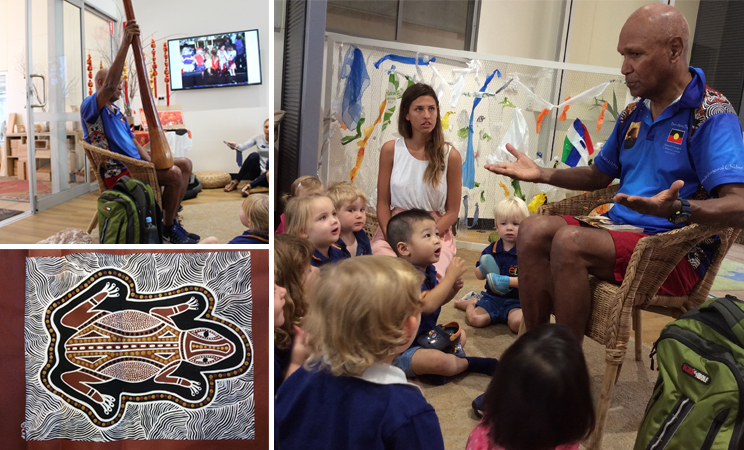
Our city of Adelaide has come alive with the buzz of the Fringe Festival, Writers Week and Clipsal – many exciting events that you may have visited with your children. This week our very own ELC community came alive as we were visited by storyteller, writer and performer, Boori Monty Pryor.
Boori was born in Townsville in 1950. His father is of the Birri-gubba people and his mother is Kunggandji. Boori is a multi-talented performer and an accomplished didgeridoo player, having played with the Brisbane Symphony Orchestra at the Melbourne Wurundjeri Welcome to Michael Jackson, and in Sydney for the Pope. Boori is in great demand as a public speaker and storyteller, and travels extensively throughout Australia and overseas year-round to perform for school students and professional adult groups.
We were thrilled to have Boori spend time with us at our ELC. He was able to instantly create a strong connection with the children through the act of storytelling. Boori is certainly a master of his craft, immersing and engaging his audience in the story, and the educators have all learnt and been inspired by him. We invite you to see evidence of this engagement through the photos displayed in our rooms.
We will be building on this visit by inviting the children to deepen their ideas on identity – our individual identity, our ELC community identity and our identity as Australians – through storytelling. Boori’s visit has challenged us to share our stories through telling, singing, dancing and creating to form meaningful and lasting connections.
Leanne Williams
ELC Educator
Save the Date
- 10 March : ELC Twilight Picnic from 5pm on the lawns
- 3 – 5 April : ELC Photos in the mornings
- 3 – 5 April : ELC Parent Teacher Conversations
- 14 April : Easter and School holidays
- 18 – 28 April : Vacation Care Program
News from the Stonyfell Room
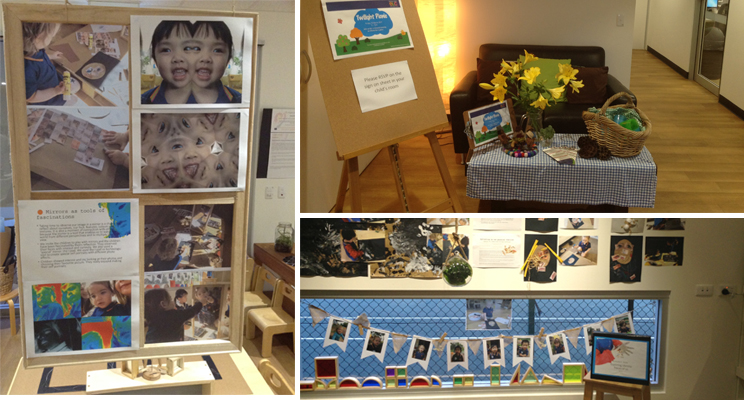
Making our learning visible
We often get asked by our families:
“What did my child do today?”
“What did they learn today?”
I know that many of you wish that you could be a fly on the wall just to see what your child gets up to during our days together. We don’t want our days to be a mystery and we invite you to engage with us and your children in conversation. However, we know that often our children are unable to communicate what they did during the day or that they might only be able to tell you part of what they did. We are also very aware that your days can be busy and you don’t always have the time to stop and look in the learning spaces or to engage in a conversation.
The staff at the ELC work very hard to provide multiple ways to communicate what happens in our days to make our learning visible. For us in the Stonyfell Room, our days are very much based around our routine and our routine moments. These moments for us are about finding the extraordinary in the ordinary. We value every moment and look deeply for the opportunities to deepen relationships, nurture independence and foster our social skills.
Some of the ways that we give visibility to our day is by:
• Documentation displayed in the learning spaces
• Newsletter
• ePortfolios
• Parent Teacher Conversations
• Daily conversations
• Email correspondence
• Slideshows on the screens around the centre
We are constantly working collaboratively to think about how we can make our days more visible for our families. We invite you to ask us when you collect your child for some information which might become a conversation starter for you when you are at home sharing a quiet moment with your child.
The educators have been working behind the scenes on further improving and developing their own skills in ICT to hopefully provide you with the information and images you are wanting in a user-friendly, technology-driven way. Please feel free to share your suggestions and ideas with us as we are constantly wanting to improve our practice to reflect the child, the parent and the educator’s voices.
Laura Reiters
Stonyfell Room
News from the Bell Yett Room
Who am I? What is my identity? What is my impact?
Who are we? What is a group? How do I belong in this group?
These are some of the questions we have been exploring in the Bell Yett Room as the children and educators research together.
Through our observations of the children and conversations with families, we know that the children are still very interested in creating and sharing representations of their hand. We have begun to recognise the hand as a symbol, an unspoken invitation that has reached out to the children. It invites them to create a trace of themselves and share this mark as evidence of their identity and their belonging to our group, our community of learners.
Through the provocations that we are offering to the children, we have been interested to see the children’s theories moving between expressing their unique identity and also their identity within the group. This is supporting the children to recognise not only the importance and benefits of being part of a community of learners, but the responsibilities that come with this.
We have introduced the children to the concept of an Essential Agreement which stems from our Primary Years Programme (PYP) curriculum. The PYP states that it . . . ‘prepares students to become active, caring, lifelong learners who demonstrate respect for themselves and others and have the capacity to participate in the world around them.’ The creation of an Essential Agreement supports the children in developing these important attitudes and attributes. In the Bell Yett Room we are introducing our Essential Agreement in terms of very important things that we agree, or promise, to do. These currently include a focus on what we need to do when we come together as a group:
• Keeping our legs crossed or tucked in close so we don’t hurt others
• Keeping our hands on our bodies so we don’t disturb others
• Sitting so everyone can see (usually in a circle or on our flat bottoms)
• Staying with the group
• Listening with your ears and your eyes
We would be interested to know if your children have shared any aspect of our Essential Agreement with you. You might want to talk with your children about some of the ‘Essential Agreements’ you have in your home or communities. We encourage you to share your children’s understandings, questions and theories with us as valuable evidence that supports our Planning for the Possible.
Leanne, Nell and the Bell Yett Team
News from the Ferguson Room
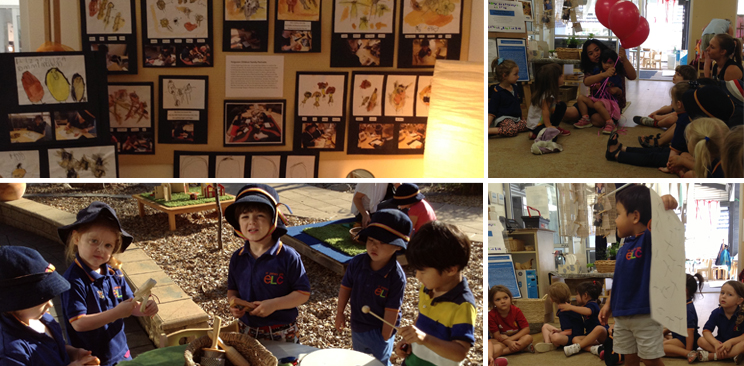
In the Ferguson Room the children, the educators and the families all have much to learn from one another. In the past few weeks we have been privileged to have rich sharing of language and culture as we continue our research into identity and ‘Who we are’ as a group.
It began with Hannah, who showed courage and leadership in teaching us how to say ‘Good Morning’ in Mandarin, following our inquiry into the traditions of Chinese New Year. Amy shared a Chinese song, and Bea taught us to say ‘Kamusta’ in Filipino. Inspired by our class’s appreciation and excitement of this new knowledge, Bea asked her parents if they could come in and teach us a traditional Filipino song. Bea and her Mummy, Jo Anne, spent two mornings in our classroom. They brought in some red balloons to complement the song, called ‘Ako ay may lobo’ (I have a balloon). Such experiences are not simply a one–way street but a reciprocal act whereby everybody is a learner. When parents and grandparents and other members of the community come into the classroom, they often express how much they also benefit from the experience. Jo Anne shared her thoughts with us in an email, and I would like to share this excerpt with all of you:
One of our goals as parents is that Bea is able to appreciate her own Filipino heritage, and we are happy that there is a connection between our conversations at home with Bea about this and in the ELC. I was also amazed at the enthusiasm of the Ferguson friends in learning different languages. A strong sense of identity and respect for diversity are really important values, and it was a wonderful opportunity to see this in the children.
What we have been experiencing in the Ferguson Room also sends a strong message to our children that we are always learning and that we can all learn from each other, not just from the people who are called ‘teacher’. The morning that Bea and Jo Anne shared their song with us, Jayden showed us his Korean ‘writing’ and taught us to say ‘Good Morning’ in Korean. To see the children empowered to confidently share their language with us in this way is very exciting and we look forward to further exploring the cultural diversity in our room that contributes to our group identity.
During her time as Thinker in Residence in Adelaide (2012-2013), Professor Carla Rinaldi of Reggio Children said that:
‘To educate means building together identity and future. …No longer can schools simply be reproducers of knowledge. They are places where children and adults construct knowledge and their understanding of the world together.’
We welcome all of our families to support their child, and share their language and special traditions with us. Please let us know if you would like to participate.
Mel Angel
Ferguson Room
News from the Hallett Room
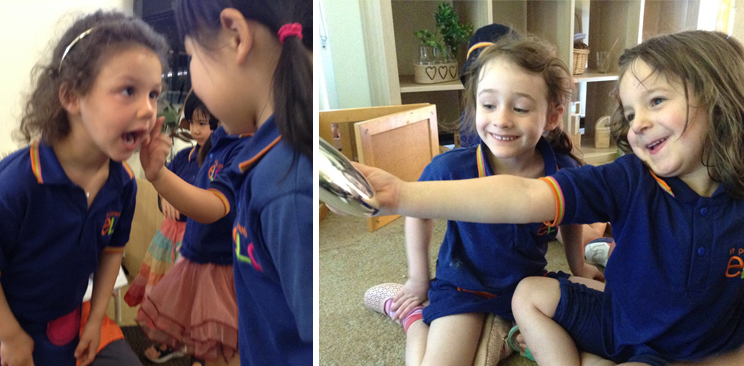
The Hallett Room children have shown a keen interest in exploring ‘eyes’. The eyes of themselves and of others. These explorations started in the light room and Atelier a few weeks ago which has been set up with mirrors in several sizes, shapes, colours and grades of reflection.
The children started to share their fascination with ‘eyes’ and began making connections between theirs and those of others. Taking time to observe our image in a mirror is a chance for us to reflect on ourselves, our face, features, colours and textures. It is also a moment of connection with others because the mirrors are a tool that enable us to watch the world from different perspectives and from multiple points of view. The children have been fascinated by their reflection. They observed their faces with interest and curiosity and they have started to share their theories.
Exploring themselves is a very important step for each human being. Children are always searching for meanings about ‘Who am I?’ and about their life. It is a crucial point for the rest of their life. To recognise themselves as an individual, is the child’s first step in expressing themself.
The mirror: the mirror is a useful tool to reflect on ourselves and of others.
- We can observe our physical features, our unique physiognomy, but we can also see the others next to us and recognise them as different and separate human beings. This is an important milestone in children’s cognitive development.
- This also promotes skills such as: observation, concentration, description.
It is important to unpack and give voice to the egocentric phase of the children. This moment in their life is fundamental to express themselves, their ideas, their own feelings and thoughts. Children will feel valued, safe and ready to open themselves to others, to give themselves to the community of learners and to be active in their social environment. They will enrich the group dynamic with their own identity.
The Atelier has been an integral place for the children to share and test theories, extend upon their ideas and explore their hundred languages using various mediums and materials. Ms Caterina, our Art Educator, has engaged in ongoing dialogue with the Hallett educators to work in collaboration to enrich the learning projects that are unfolding. A recent theory that was shared with the Hallett children by Prabir has set into motion an exciting student-led inquiry.
Prabir’s theory: “My eyes work as mirror. I can see my face in my eyes.”
Rachel said: “No… isn’t true!”
We invited the children to try to see themselves in their friend’s eyes.
Rachel then exclaimed: “I can see myself in your eyes!”
At present in the Hallett Room, the eye is working as a connector, it is a vehicle to work together as a group and for us, the educators, a way to discover and understand children’s co-construction of knowledge and groups dynamics.
We are extremely eager to share this project with you, our families, as it unfolds and we encourage you to have a look at the documentation that is displayed around the room.
Caterina Pennestri, Pam Reid, Kirsty Porplycia
Hallett Room
